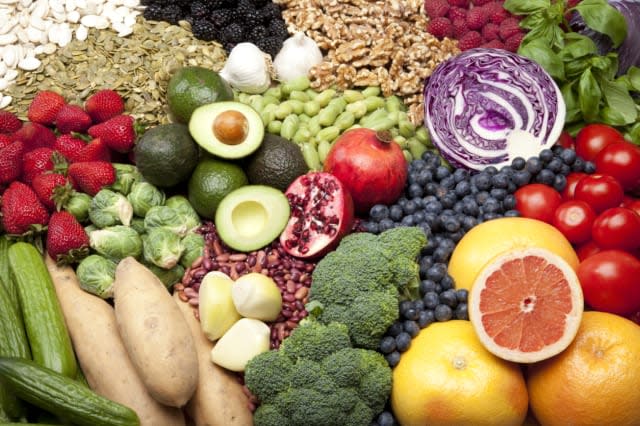Seven superfoods for women over 50

Making the right food choices in midlife can go a long way to improving your health and reducing your risk of high blood pressure, heart disease, breast cancer and osteoporosis. If you're a woman in your fifties or older, here are seven foods you should be eating.
See also: Seven foods to ease the pain of arthritis
See also: What older women should eat to lose weight and feel great
1. Soy
If you're struggling to deal with the symptoms of menopause, you might want to think about getting more soy in your diet. Research shows that soy isoflavones, plant oestrogens that mimic the structure of the female hormone, help regulate oestrogen and can help calm hot flushes. Not only that, but women who eat soy products – either as soy milk, tofu or edamame beans – during and post menopause are less likely to develop breast cancer.
A soy-rich diet is also good for the heart, helping to reduce your cholesterol levels by around 6% according to Heart UK. As heart disease is the second leading cause of death for women in the UK, that has to be good news.
2. Turmeric
Scientists have long been aware that elderly people in India have low rates of Alzheimer's disease, and one reason may be that they consume a lot of turmeric in their diets. One 2009 study found that eating turmeric foods at least twice a week may help prevent Alzheimer's disease and dementia.
As well as potentially helping to lower your risk of Alzheimer's disease, curcumin, the active ingredient in the spice, is also a natural painkiller. One study found that curcumin was just as good as Ibuprofen when it came to relieving painful knees in those suffering from osteoarthritis. Another study found that curcumin was better at reducing pain and swelling in patients with rheumatoid arthritis than the commonly prescribed drug diclofenac.
3. Pumpkin seeds
Feeling tried? You might want to snack on a handful of pumpkin seeds.
Anaemia affects women more than men (due to menstruation) but it can affect you after the menopause too. In fact, a 2010 study suggested that the risk of anaemia increases with age.
If you often feel tired and suspect anaemia, see your GP who can run a simple blood test. In the meantime, taking iron supplements and boosting your diet with iron-rich foods can help. It's not just liver and red meat that contain iron. One of the best dietary source of the mineral is pumpkin seeds.
4. Oily fish
Older women, especially those aged over 65, are at an increased risk of vitamin D deficiency. The best way to get your dose of the sunshine vitamin is to get out in the sun for 10-15 minutes a day, without sunscreen. It's a good idea to take a supplement of vitamin D (10 micrograms per day) if you can't get out, and during the long, dark days of winter.
Very few foods in nature contain vitamin D. The flesh of fatty fish, such as salmon, tuna, and mackerel) and fish liver oils are among the best sources. Small amounts of vitamin D are found in beef liver, cheese, and egg yolks.
5. Walnuts
Snacking on nuts is a good way to reduce levels of bad cholesterol in the body, and have been shown to help support the brain and reduce breast cancer risk.
The health benefits of omega-3 fatty acids are widely documented – helping to reduce inflammation, improve heart health and lower anxiety and depression. If you're not keen on fish, try walnuts. They are one of the best plant sources of omega-3 fatty acids.
A study by researchers at the St Luke's Medical Center in Chicago found that people who consumed the most vitamin E from their diet reduced their risk of developing Alzheimer's by 67 per cent compared to those who ate the least. Walnuts (along with almonds and pecans) are a great source of vitamin E – another good reason to add them to your diet.
6. Leafy green vegetables
Make sure you get plenty of leafy green vegetables and broccoli on your plate.
Many women post-50 don't get enough folate (vitamin B12) from their diets. Yet boosting the amount of folic acid can help to reduce the risk of strokes and heart disease, say scientists.
Folic acid is already recommended for pregnant mums, but the elderly need to increase the amount they take too, as it helps reduce the level of homocysteine, an amino-acid which can lead to vascular disease, according to researchers from the University of Aberdeen Medical School.
Eating your greens can also help keep your brain sharp. The B vitamins within veg like kale, spinach and cabbage, maintain healthy levels of an amino acid that impairs brain function, while a lack of folate can cause problems when it comes to performing cognitive tasks.
As well as leafy green vegetables and broccoli, other folic acid-rich foods include liver, wholegrain cereals and citrus fruits. Or you might want to consider taking a folate supplement.
7. Green tea
If you really want to give your health a boost, switch to green tea.
Studies show that green tea has anti-inflammatory properties, which can help halt the progression of rheumatoid arthritis. A study from Case Western Reserve University in the US found that EGCG (a substance in green tea) may halt arthritis progression by blocking interleukin-1, a pro-inflammatory cell, from damaging cartilage.
Green tea also have the highest levels of polyphenols, a type of antioxidant which helps to protect against cancer – one of the leading causes of death in women in later life. A good choice is Matcha powdered green tea leaves.



